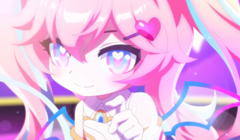As South Korean female game developers face violent backlash for perceived feminist gestures, a growing anti-feminist movement gains traction, cultivating a climate of fear, discrimination, and silencing within the gaming community.
"Feminism Under Siege: The Dark Side of Gaming Culture in South Korea"

"Feminism Under Siege: The Dark Side of Gaming Culture in South Korea"
Concerns grow as female gamers face harassment and witch hunts fueled by anti-feminist sentiment, highlighting deep-rooted gender discrimination in South Korea's gaming industry.
In South Korea's vibrant gaming landscape, a troubling narrative is emerging that disproportionately targets female game developers. In an alarming incident, a female artist known as Darim faced a deluge of death threats after a hand gesture in the trailer for her game, MapleStory, was mistaken for a feminist symbol. Despite the non-intentional similarities, her revelation of her work spiraled into a damaging crisis, fueled by a toxic culture within the male-dominated gaming community.
The outrage erupted online shortly after Darim shared the video, which depicted a female character holding her thumb and forefinger together. Male gamers misconstrued the animation to resemble a derogatory gesture associated with anti-feminist sentiments. Their wave of hostility directed towards her resulted in pervasive threats affecting both her professional and personal safety. “I never imagined expressing my art could result in such animosity,” she expressed, articulating the distress caused by the barrage of hate messages.
This incident is not isolated; it reflects a disturbing trend involving coordinated hunts where male gamers actively seek out women in the industry who exhibit feminist leanings. These online mobs target companies and demand the dismissal of female employees who, they believe, are undermining men. The chilling effect of this harassment manifests itself across the workplace, forcing many women to conceal their beliefs out of fear of retribution.
Minsung Kim, a 22-year-old gamer who once resonated with the anti-feminist ideology, has established an organization to counteract these witch hunts. He emphasizes that the misguided concept of feminism among many young men is not rooted in reality but rather distorted through online forums bearing radical opinions. “We have to challenge these stereotypes,” he said, encouraging widespread support for victims of the ongoing witch hunts.
Darim's case prompted her studio to reassess its approach under pressure, with the gaming company Nexon quickly retracting its promotional content. Following backlashes from feminist groups, she is now contemplating her future while acknowledging the precariousness of her career.
Amidst a backdrop of systemic gender inequality, with South Korea holding one of the most significant gender pay gaps among developed nations, women's rights are becoming contentious. As feminist activism resurges, men are often left feeling marginalized by societal shifts. This sentiment is not unfounded; since the anti-feminist backlash escalated in the mid-2010s, protests regarding sexual violence and gender rights have led to heightened tensions.
The current anti-feminist sentiments observe a repeat of narratives where perceived threats from women rallying for rights are met with aggression from some segments of the male population. Anecdotal accounts reveal alarming instances of violence, with women, like Jigu, victimized not just online but also offline. Following a brutal assault due to her appearance, which was mischaracterized as feminist, Jigu has decided to embrace her identity as a feminist, employing her experience to uplift other victims.
With increasing incidences of harassment and backlash, measures for change and legal advocacy are being pursued fervently. Critics point to the lack of robust anti-discrimination laws governing workplaces, which they argue enables the mistreatment of women advocating for gender equality.
Feminism in South Korea now seeks to galvanize awareness and educate both men and women to dismantle misconceptions surrounding gender rights. As the dialogue evolves, fostering an inclusive environment devoid of discrimination remains crucial for empowering women in the gaming industry and beyond. The demand for accountability ultimately serves as a beacon for those grappling in a turbulent socio-cultural climate.





















